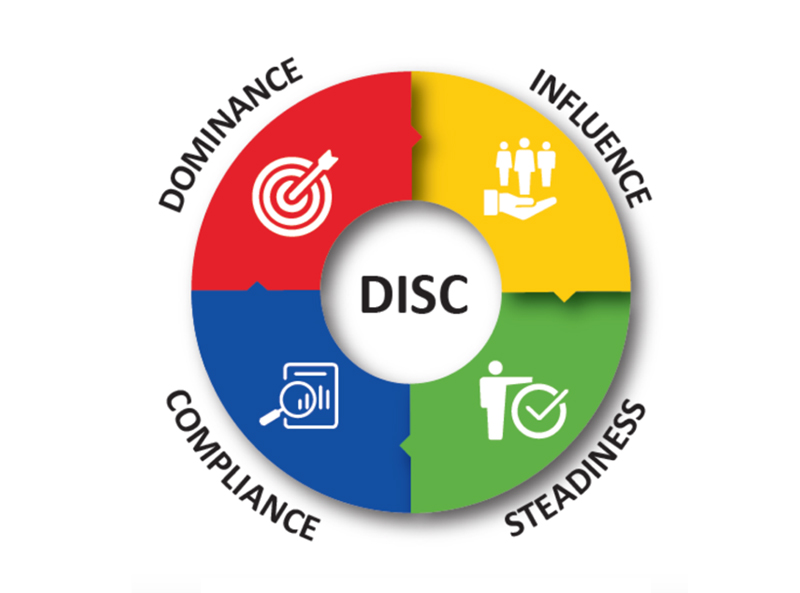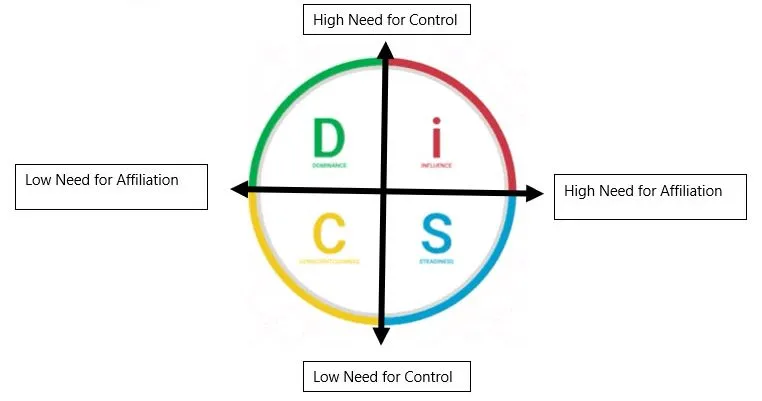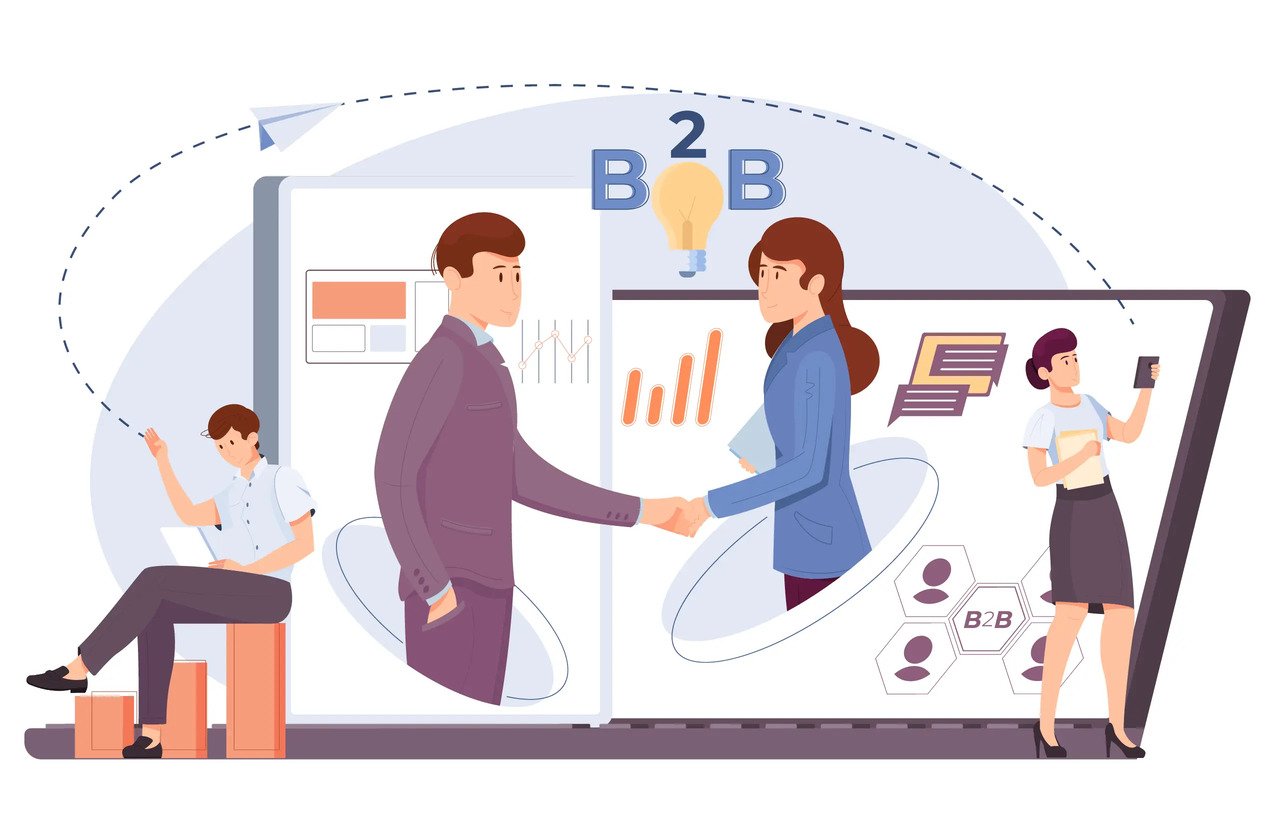Table of content
The DISC Styles of Salespeople: Traits, Strengths, and Strategies
Understand the DISC styles of salespeople by learning their traits and strengths, and how to adapt your approach to close more deals effectively.
The DISC styles of salespeople show how different personality types approach selling and connect with people. Each style has unique strengths and problems that can impact your success. In this guide, we'll look at the four DISC profiles and offer strategies to help you adjust and close more deals.
Why Understanding Styles of Salepeople Matter?
Organizations that leverage the DISC styles of salespeople report significant gains in areas like customer engagement, team collaboration, and training effectiveness. According to sales strategy resources, tailoring communication to a prospect’s DISC style can boost sales results by 17% or more.
Enhanced Customer Engagement
When salespeople can identify and adapt to a customer's style, they build rapport more effectively. According to an Acquia Customer Experience Trends Report from 2019, 78% of U.S. consumers stated that they are more likely to be loyal to a brand that understands them on a personal level.
Instead of using a one-size-fits-all approach, salespeople can mirror the client's communication style, being direct with a decisive client or more personable with a relationship-focused one.
Stronger Team Dynamics
A sales manager who understands each team member's style can create a more balanced and collaborative environment. By recognizing the strengths and weaknesses of each personality type, they can assign tasks and build partnerships that leverage individual talents. For example, pairing a detail-oriented salesperson with a big-picture thinker can create a powerful team dynamic for complex projects.
Customized Training Programs
Knowing the different styles allows for the creation of targeted training and coaching. Instead of generic workshops, a manager can provide personalized guidance that resonates with each individual's needs.
For example, high-Influence team members may prefer interactive, fast-paced modules. Those high in Compliance benefit from structured, detail-oriented training—boosting retention and skill application.
Improved Customer Alignment
A deep understanding of sales styles helps align the right salesperson with the right customer. This is crucial for long-term success. Placing a patient, relationship-focused "S" salesperson in charge of a key account. Or a results-driven "D" salesperson on a new business project ensures that the customer's needs are met by a personality that is best suited to handle them.
The Four DISC Styles and Their Sales Approach
The DISC styles of salespeople categorize selling behaviors into four major personality types, each influencing how a salesperson communicates, forms connections, and closes deals.

Dominance (D) - The Driver
Salespeople with the Dominance style are assertive, confident, and thrive on achieving results quickly. Their biggest strength lies in their ability to take charge, close deals decisively, and push through obstacles in high-pressure environments.
However, their direct, fast-paced approach can sometimes lead them to overlook details or neglect active listening, which may leave prospects feeling unheard. Drivers are particularly effective in industries such as real estate, technology sales, and high-ticket B2B markets where confidence, speed, and goal orientation are highly valued.
Influence (I) - The Socializer
The Influence style is outgoing, persuasive, and naturally skilled at building rapport. These salespeople excel at networking, creating strong first impressions, and engaging clients emotionally, strengths that make them effective in relationship-driven selling.
On the downside, Socializers may struggle with organization, follow-through, or handling technical details, which can sometimes undermine their credibility. This DISC style of salesperson thrives in industries like hospitality, media, advertising, and retail, where personal connection and enthusiasm drive results.
Steadiness (S) - The Supporter
Supporters are dependable, empathetic, and excellent at nurturing long-term relationships. Their steady, patient approach makes them strong in roles that require trust, loyalty, and consistent follow-up, such as account management or customer success.
Their main weakness is resistance to change, they may find it difficult to adapt quickly in fast-moving or highly competitive sales environments. The Steadiness style is well-suited to industries like healthcare, education, and financial services, where reliability and client care are essential.
Compliance (C) - The Analyst
Analysts are detail-oriented, systematic, and prioritize accuracy and professionalism. Their strength lies in their ability to provide data-driven solutions, answer complex questions, and build trust through expertise.
However, their tendency to overanalyze can sometimes slow down the decision-making process, causing missed opportunities. Analysts thrive in industries such as pharmaceuticals, engineering, consulting, or financial analysis — fields where precision and technical expertise are critical.
Ideal DISC Styles of Salespeople
A common question in sales is: What is the ideal personality type for sales? The truth is, there is no single perfect DISC profile for sales. Instead of looking for one ideal type, it's more productive to understand how different DISC styles of salespeople are best suited for different roles and sales environments.

The most effective salespeople are those who can leverage their natural strengths while adapting their approach to the specific needs of the customer and the sales cycle. The concept of "Hunters" and "Farmers" provides an excellent way to understand how different DISC styles fit into various sales roles.
- The Hunter: This is the salesperson who is skilled at hunting new business, creating leads, and completing agreements swiftly. This role is frequently a good fit for people who have a strong Dominance (D) or Influence (I) style. Their energy, competitiveness, and social appeal make them ideal for cold calling and short sales cycles.
- The Farmer: This salesperson is responsible for developing current client relationships, managing accounts, and guaranteeing long-term customer happiness. This role is frequently a good fit for people with a strong Steadiness (S) or Compliance (C) style. Their patience, dependability, and attention to detail make them excellent at establishing trust and loyalty.
Ultimately, the most effective DISC sales professionals are those that can adapt. While a salesman may have a naturally dominant style, their ability to identify a prospect's style and adapt their own approach is what actually distinguishes them.
How to Identify Your DISC Sales Style
To effectively benefit from the DISC styles of salespeople, you must first identify your own. There are two primary ways to do this: through a formal, standardized assessment or informal self-reflection and feedback. Both methods provide valuable insights into your behavioral preferences and natural strengths in a sales context.

DISC Assessment
A DISC sales assessment is a scientifically proven technique that assesses your preferences across all four DISC characteristics. After answering a series of questions, you'll receive a detailed DISC profile for sales that outlines your primary and secondary styles.
The results provide valuable insights into your communication style, motivation, and desired work setting. This formal procedure is the most effective way to identify your unique sales personality type, and it can serve as the foundation for personalized coaching and growth.
Methods of Self-Reflection
If an assessment is not immediately available, you can start the process of self-discovery by reflecting on your conduct and soliciting feedback.
- Self-reflection: Consider the following questions:
- What is your typical reaction to a sales objection? Do you get right to the point (D), try to win them over with charm (I), calmly listen (S), or provide extra information (C).
- How do you prefer to communicate with your clients? Are you direct and concise, or do you prefer long conversations?
- Ask for Feedback: Ask your manager or a trustworthy colleague to describe your sales approach. This objective perspective can reveal vital insights that you may not perceive yourself, allowing you to better understand your personality of a salesman.
To understand what the results mean, read our guide on How to Interpret a DISC Graph: A Complete Guide to Your 'Real' Self
Applying DISC to Your Sales Strategy
The actual strength of the DISC framework is found in its application to all parts of your sales organization. Instead of being just a personality test, DISC becomes a strategic tool to improve hiring, training, and overall sales performance. By leveraging the DISC styles of salespeople, you can create a more cohesive and producFby tive sales force that is better equipped to handle diverse challenges.
For a broader perspective, see How To Apply The DISC Personality Test To The Workplace

1. Hiring and Building the Right Team
When assembling a sales team, diversity in personality type is a valuable asset. Instead of recruiting an entire team of "Hunters" or "Farmers," a DISC evaluation for sales can assist you in identifying complementary styles.
For example, a team led by a high-D can benefit from an S-style account manager who excels at customer retention. A variety of styles guarantees that your team can handle a diverse range of customer personalities and sales situations.
2. Coaching and Training Salespeople
Effective sales coaching is not a one-size-fits-all approach. A sales manager can personalize training and feedback for a salesperson based on their DISC profile.
- For a D-style salesperson, concentrate on results and competition. Challenge them with specific, quantifiable goals and give them autonomy.
- For an I-style salesperson, give them recognition and opportunities for collaboration. Their motivation stems from being a member of a successful team and gaining recognition.
- For an S-style salesperson, focus on consistency and a defined procedure. Give them a defined path map and ensure them that their contributions to client connections are appreciated.
- For a C-level salesperson, provide facts and extensive details. Provide them with the materials they need to become experts, as this is where their confidence grows.
3. Boosting Sales Performance with DISC
The DISC types of salespeople framework is more than just a personality guide; it's a strategic instrument for increasing conversions and strengthening customer relationships.

- Match your style with the buyer's needs: A Driver (D) may strongly pitch to decisive consumers, whilst a Socializer (I) can quickly connect with relationship-oriented customers.
- Adapt in real time: If you think a prospect prefers extensive explanations, lean toward Analyst (C) behaviors; if they respond better to trust and reassurance, shift toward Supporter (S) characteristics.
- Leverage team strengths: Assign leads to salespeople whose sales style best matches the prospect's personality type, boosting the likelihood of closing.
Final Thoughts
Understanding DISC styles of salespeople is more than a theory; it's a useful tool for professional development. You may communicate more effectively, create deeper relationships, and complete more deals by determining your natural selling style with a DISC evaluation and learning how to adapt to your clients' preferences.
There is no "perfect" DISC profile for sales; the key is flexibility. The finest salesmen combine the abilities of many profiles, tailoring their approach to the prospect and situation.
FAQs
What is the best DISC style for sales?
There is no singular "best" DISC style for sales. A highly "Dominant" salesperson may excel in closing new business, whereas a "Steadiness" type may be excellent at developing long-term client connections. The most effective salespeople are those who can modify their manner to fit the situation.
Can a salesperson have more than one DISC style?
Yes. Most salesmen have a strong style supported by secondary characteristics. This combination can improve adaptability and allow you to interact with a wider range of clients.
How do I find out my DISC sales style?
The most accurate way to determine your own style is to take a certified DISC assessment for sales. This generates a full report about your behavioral profile. You can also get insight by reflecting on your actions and asking for feedback from colleagues or your management.
How can DISC styles improve sales performance?
Understanding salespeople's DISC types allows you to personalize communication, create rapport more quickly, and anticipate customer demands, all of which increases the likelihood of closing business.
Can DISC predict job success?
Not precisely. DISC does not ensure sales success, but it does help identify behavioral strengths and areas for improvement. When paired with skill training and experience, it has the potential to greatly boost your performance.


Don't Let Your Potential Stay Hidden!
Take the DISC test today and discover your unique 'YOU', with deep insights into your true personality and potential.

Represents your instinctive behaviors and desires.
Shows the behavioral tendencies you think you should exhibit in specific situations.
Related articles
You may also be interested in
 DISCJan 06, 2026
DISCJan 06, 2026DISC Personality Test for Sales: Unlock Your Team’s Full Potential
DISC Personality Test for Sales helps sales teams improve role fit and performance. Learn how DISC boosts hiring, coaching, and customer alignment.
 DISCJan 06, 2026
DISCJan 06, 2026How to Read DISC Test Results: Understanding Your Personality Profile
Learn how to read DISC test results and understand your personality profile. Discover how DISC can enhance communication, teamwork, and career growth.
 DISCDec 31, 2025
DISCDec 31, 2025What Is Group Culture? How Team Behaviors Shape Workplace Success
Discover what is group culture and how it shapes team dynamics, decision-making, and performance. Learn how the DISC model can help improve your team’s culture.
